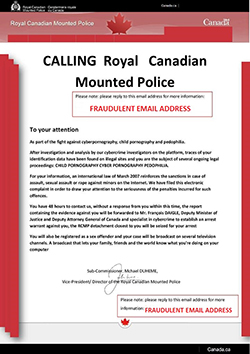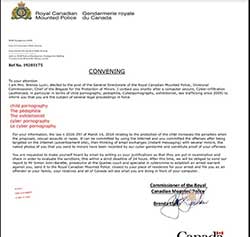Extortion
Note
If you are in immediate danger, please call 911. If you are afraid for your safety or the safety of others, please contact your local police.
Fraud alert!
October 2, 2024: The CAFC is receiving reports of extortion letters being sent by email. The extortion letters have your full name, personal telephone number, personal residential address and a screenshot from search engines. The letter claims that you have visited explicit websites and threatens to send a copy of a video to your contact list unless you pay them using cryptocurrency. Some letters may also use a QR Code. This is a fraud! Do not send money under pressure and do not repy to threatening messages. Report it to your local police and the CAFC.
Fraud medium:
- Email and text
- Internet
- Phone and fax
Targeting:
- Businesses
- Individuals
Extortion happens when someone unlawfully obtains money, property or services from a person, entity, or institution through coercion.
On this page :
- Examples of extortion messages
- Bomb threat
- Denial of Service (DOS)
- Email alerts
- Explicit video
- Hitman
- Hostage
- Hydro
- Immigration extortion
- Law enforcement
- Sextortion
- Taxpayer or Canada Revenue Agency
- Telephone calls targeting the Asian community
- Additional variations
Examples of extortion messages
The following images are examples of extortion messages. Never click suspicious links and don't trust that the sender is who they say they are. If you get a message similar to the ones below, report it to the CAFC.

This image is an example of a fraudulent letter being sent around. The letter claims to be from the RCMP Commissioner and appears to look like the RCMP website. The message of the letter accuses the reader of serious criminal charges and asks that you respond to an email to avoid arrest. This is a fraud.

This image is an example of a fraudulent letter being sent around. The letter claims to be from the RCMP's Commissioner and uses Government of Canada logos. The message of the letter accuses the reader of serious criminal charges and asks that you respond to an email to avoid arrest. This is a fraud.

This image is an example of a fraudulent letter being sent around. This example is in English only but the appearance and gist of the message remain an important warning for all. The letter claims to be from the CAFC and uses their logos. It threatens that you have a warrant for arrest and further legal action will be taken if you don't respond as soon as possible. This is a fraud. Report it.

This image is an example of a fraudulent letter being sent around. This example is in English only but the appearance and gist of the message remain an important warning for all. The letter claims to be from the RCMP and uses RCMP logos. The letter targets victims of crypto investment frauds. Suspects want victims to reply to a fraudulent email address and, in most cases, will request a payment to assist with their investigation. This is a fraud.

This image is an example of a fraudulent letter being sent around. This example is in English only but the appearance and gist of the message remain an important warning for all. The letter claims to be from the RCMP's Commissioner and uses Government of Canada logos. The message of the letter accuses the reader of serious criminal charges and asks that you respond to an email to avoid arrest. This is a fraud.

The image depicted here is an example of a fraudulent letter being sent around. This example is in French only but the appearance and gist of the message remain an important warning for all. The letter claims to be from the RCMP's Commissioner and uses RCMP logos. The message of the letter accuses the reader of serious criminal charges and asks that you respond to an email to avoid arrest. This is a fraud.
Bomb threat
A fraudster sends an email to a person or business stating that they're an assassin and they've planted a bomb. They demand a large sum of money (possibly in Bitcoin) in return for not carrying out the mission.
Denial of Service (DOS)
Fraudster send an email to a business threatening to attack or bring down the business's website and internet services. The email states it's from a hacker group. It requests payment via Bitcoin or other crypto currencies immediately.
Email alerts
You are sent an extortion letter by email that has your full name, personal telephone number, personal residential address as well a screenshot from search engines. The letter claims that you have visited explicit websites and threatens to send a copy of a video to your contact list unless you pay them using cryptocurrency. Some letters may also use a QR Code.
Explicit video
Via email, a fraudster claims to have hacked your computer and recorded you performing an explicit act (i.e., masturbation). They often cite some of your personal information (e.g. Social Insurance Number) or a password you have used as proof of the hack. They state that they will release the video publicly if you do not pay a fee via Bitcoin.
The computer has not been hacked. The password cited was obtained in a previous data breach.
Hitman
These emails claim that someone betrayed you and hired the sender to kill you. The sender offers to cancel the contract and provide the name of the person who hired them, for a cost. The email requests the payment in Bitcoin and provides an address to send the payment to.
In some variations, the fraudster claims to have links to terrorist organizations.
These emails attempt to create a sense of urgency and alarm to get you to send money.
Hostage
Fraudsters claim to be high-ranking government officials. We've received reports of fraudsters saying they were the Minister of National Defense, the Minister of Finance or the Minister of Public Safety.
The fraudster asks for financial help from the business to pay a ransom. They may state that employees of the business are being held hostage. While the ransom demand is real, the actual hostage-taking is fake.
These frauds are well constructed. They appear to come from Canadian government officials who are known to the recipient. The fraudsters target various industries, but often within the critical infrastructure industry.
Hydro
A fraudster claims to be an employee of a local or provincial hydro company. They state that you or your business have an unpaid balance on your hydro bill. You must pay it immediately or the company will turn off your power.
The fraudster may request payment via money service businesses, pre‐paid cards/gift cards (iTunes Google Play or Steam cards) or Bitcoin.
Immigration extortion
The fraudster calls you at home and claims to be with Immigration, Refugees and Citizenship Canada (formerly Citizenship and Immigration Canada). They tell you that you've failed to complete or register certain immigration documents. They insist you need to pay the fees immediately or risk:
- deportation
- loss of passport
- loss of citizenship
Learn more about immigration frauds and fraud.
Law enforcement
An email or phone call claims to be from a law enforcement agency, such as the RCMP, Interpol or Europol. They will use police logos or other identifiers to appear legitimate. The message could be:
- A fraudulent letter accusing you of criminal charges and asking you to contact them to avoid going to jail
- A message demanding you send money to avoid arrest
- An email with a malicious attachment that they ask you to open
These are all frauds. Law enforcement will never demand payment and will not threaten arrest by email or phone. If in doubt, contact the law enforcement agency directly.
Sextortion
Fraud Alert!
July 13, 2022: The CAFC continues to receive reports of victims who have been convinced to perform intimate acts in front of their device's camera and threaten to release images or video unless paid.
Fraudsters create fake profiles on social media and pornographic and dating websites. They use these profiles to lure you into a relationship and coerce you into performing sexual acts on camera.
The fraudster records the session and threatens to send the image or video to other people unless you pay or provide more sexual content.
How to protect yourself
- Recognize that live streaming can be recorded and that pre-recorded video can be livestreamed
- Familiarize yourself with social media privacy settings and consider limiting who has access to your personal information (i.e. friends list, location)
- Unless you know the person offline, there is no way to confirm who is on the other end
- Trust your instincts, be skeptical and cautious
- Never send money to someone you haven't met
- Learn more and protect yourself from sextortion
- Learn more tips and tricks for protecting yourself from fraud
Taxpayer or Canada Revenue Agency
A fraudster claims to be an employee of either the Canada Revenue Agency or Service Canada. They state that you:
- have a compromised SIN number
- have an outstanding case against you
- owe back taxes
- have unpaid balances
- committed a financial crime
They threaten that if you do not speak to them immediately, you'll be arrested, fined or even deported.
The fraudsters may request payment via money service businesses, pre‐paid cards/gift cards (iTunes, Google Play or Steam cards) or Bitcoin.
Telephone calls targeting the Asian community
The Asian community in Canada is being targeted with automated calls claiming to have an urgent message from sources such as:
- the Beijing police
- INTERPOL
- the Chinese consulate
- a delivery agency
These calls can be very intimidating and threatening.
The fraud calls vary, but generally they claim customs intercepted a letter or package in your name, and implicate you in the fraud. For example, the message may state that customs stopped a suspicious package containing many bank cards and you are the subject of an investigation.
Additional variations
- Directing you to go to a fake "police" website to verify your identity and provide a copy of your passport
- Informing you that there fraudulent funds in your account and asking for your banking information to verify
- Date modified: